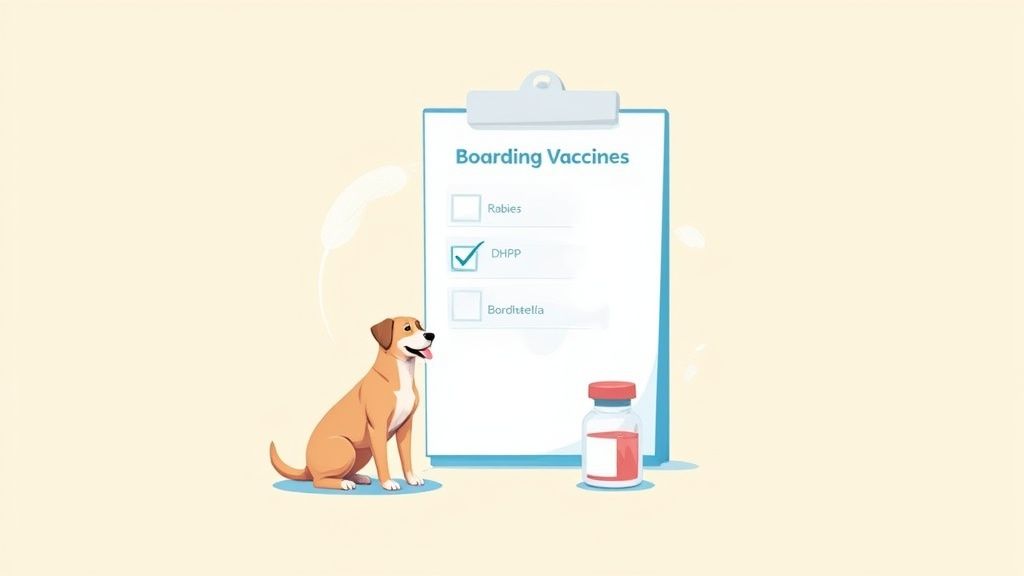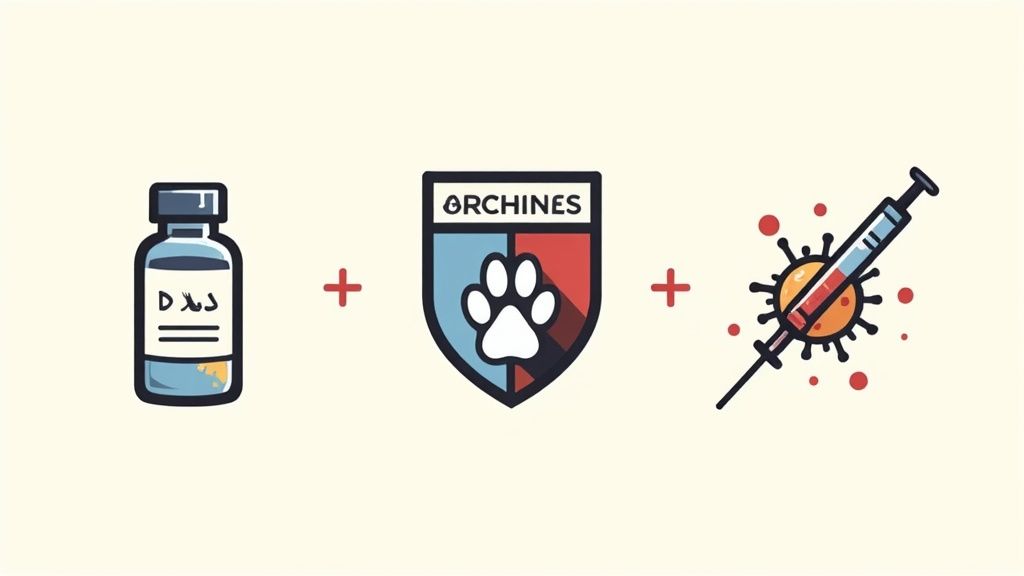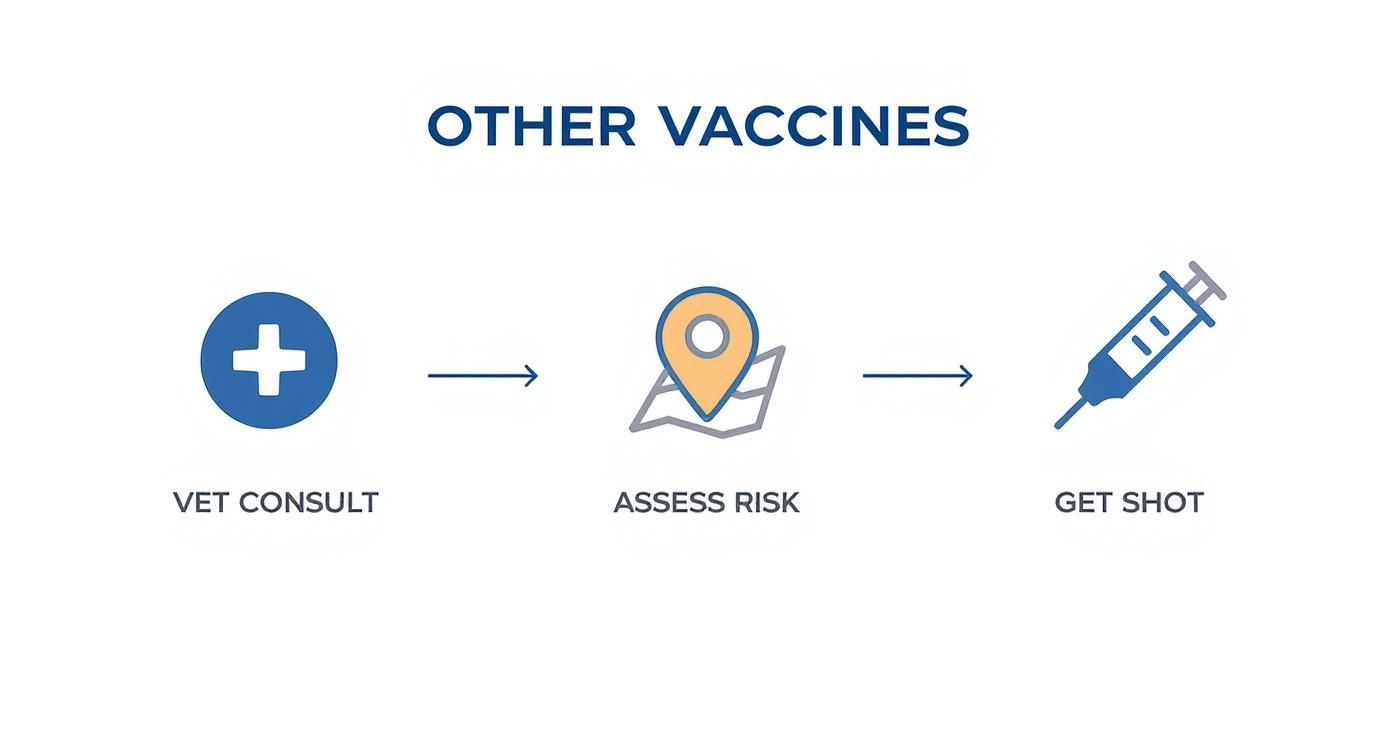Your Dog's Vacation Checklist: What Shots Do Dogs Need to Be Boarded?
- ericavdippold
- 13 minutes ago
- 10 min read
Hey there, fellow dog lover! As the owner of a busy doggy daycare and boarding spot, one of the first questions I get from pet parents is, "So, what shots do dogs need to be boarded?" It’s a fantastic question, and I'm always so glad when people ask it. It shows you're not just thinking about your own pup's safety, but the well-being of the whole furry crew they'll be hanging out with.
So, let's get right to it. The "big three" we require here (and pretty much any reputable place will, too) are Rabies, DHPP (which covers Distemper, Hepatitis, Parainfluenza, and Parvovirus), and Bordetella, which you probably know as kennel cough.
Think of these as the non-negotiable golden tickets for your pup to have a safe and super fun social vacation with us.
Why Vaccines Are a Must for Group Play

I like to think of our play areas like a children's schoolyard. You know how one kiddo coming to school with a sniffle can quickly spread it to the entire class? It’s the exact same with our dogs. Vaccines are like an invisible shield, protecting your best friend from contagious (and totally preventable) illnesses that can easily make the rounds in social settings.
This is why any boarding facility worth its salt has strict vaccination policies. Honestly, it’s the most important thing we do to make sure our space stays happy and healthy for every single one of our furry guests.
Curious about what else goes into creating a safe and fun group environment? Dive deeper with our complete guide to dogs in daycare.
My philosophy has always been that prevention is way better than cure. By making sure every dog is up-to-date on these core vaccines, we can all relax and focus on what really matters: happy dogs, exciting playtime, and peaceful stays.
Let's break down each of these required shots so you know exactly what they are and why they’re so vital for your dog's home-away-from-home.
Dog Boarding Vaccine Requirements at a Glance
To make it super simple, here’s a quick chart of the essential vaccines, what they protect against, and why they're critical for a safe boarding experience.
Vaccine Name | What It Protects Against | Why It's Required for Boarding |
|---|---|---|
Rabies | A fatal viral disease affecting the nervous system. | It's a huge public health risk, fatal to both dogs and people, and it's the law in most places. No exceptions! |
DHPP | Distemper, Hepatitis, Parainfluenza, and Parvovirus. | This is our superhero "combo" shot that guards against several highly contagious and often deadly airborne diseases. |
Bordetella | Infectious tracheobronchitis, or "kennel cough." | It protects against a super common and contagious respiratory bug that spreads like wildfire wherever dogs hang out together. |
Having these vaccinations current means your dog is protected, and it helps us keep our playgroups healthy and ready for a good time.
The Core Three: Rabies, Distemper, and Parvovirus

When it comes to keeping every single dog safe and sound at our facility, there are three vaccinations that form the absolute bedrock of our health rules. I call them the "Core Three," and they're completely non-negotiable for any pup who wants to come play.
First up is Rabies. This isn't just our rule; in most states, it's the law. Rabies is a devastating and fatal virus, making this vaccine a crucial public health measure for our pets and us humans, too. There’s zero wiggle room on this one.
Next on the list is the DHPP shot, which your vet might just call the "distemper vaccine." This is a brilliant combination vaccine that acts as a powerful shield against a whole bunch of nasty illnesses.
What's in the DHPP Shot?
Think of the DHPP vaccine as a 4-in-1 guardian for your dog. It protects against some of the most contagious and serious diseases out there.
Here's a little breakdown of that jumble of letters:
D - Distemper: A nasty virus that can attack a dog's respiratory, digestive, and nervous systems.
H - Hepatitis (Adenovirus): This isn't the same as human hepatitis, but it's a serious viral infection that targets a dog's liver.
P - Parainfluenza: A respiratory virus that is one of the main culprits behind kennel cough.
P - Parvovirus: This is a particularly tough and highly contagious virus that's especially dangerous for puppies. It viciously attacks the gastrointestinal tract and can be fatal.
Because these diseases can spread so easily in social settings, the DHPP vaccine is an absolute must-have. It's all part of being a responsible dog owner and helps us protect every single dog in our care.
I can tell you from years of experience that these core vaccines are what allow us to create a safe, fun environment. With this baseline of protection in place, we can all breathe easy and focus on what really matters—happy dogs having a great time.
And this isn't just my policy; it's the standard across the industry, built on decades of experience. In fact, 95% of boarding kennels require the distemper and parvovirus vaccines. On top of that, over 92% mandate the rabies shot. It really shows a united front when it comes to keeping our pets safe. Our friends at Animal People Company have a great article that also breaks down these common boarding requirements.
The Kennel Cough Vaccine Explained

Ah, the Bordetella vaccine—better known as the "kennel cough" shot. This is easily the one I get the most questions about from new clients! The simplest way I explain it is to think of it as the doggy version of the human flu shot. Just like kids in a classroom, when a bunch of dogs get together to romp and play, germs can spread quickly.
"Kennel cough" isn't one specific disease; it's more of a catch-all term for a yucky, highly contagious respiratory infection, kind of like a bad chest cold in people. While a few different viruses and bacteria can cause it, the main troublemaker is a bug called Bordetella bronchiseptica. The vaccine gives your dog's immune system a head start so it can fight it off effectively.
Why Bordetella Is a Top Priority
Kennel cough is airborne, spreading through coughs, sneezes, and even shared water bowls and toys. It can sweep through a group of dogs in no time flat. That’s precisely why virtually every boarding kennel, daycare, and groomer makes the Bordetella vaccine mandatory. It’s a vital step in protecting the entire community of dogs that we look after.
Your vet can give this vaccine a few different ways, and they'll help you pick the best one for your pup:
Intranasal: A simple, quick puff of mist that's sprayed right into your dog's nose.
Oral: A needle-free liquid that's given by mouth. No owies!
Injectable: A traditional shot, just like their other core vaccines.
I always say the Bordetella vaccine is all about community immunity. When every dog in our facility is vaccinated, we create a much safer and healthier environment for all the pups. It’s the single best way to stop an outbreak in its tracks.
It’s also important to have realistic expectations. Just like the human flu shot, the vaccine doesn't offer a 100% guarantee against infection. But what it does do is dramatically lower the risk of your dog getting sick. And if they do happen to catch a strain, their symptoms will be far, far less severe. We talk all about this in our article, "Can a dog get kennel cough if vaccinated?".
Other Important Vaccines to Consider
Beyond our core requirements, there are a couple of other vaccines you'll want to have on your radar. We often call these "lifestyle" vaccines because whether your dog needs them really depends on their daily routine and where you live.
Think of it this way: someone whose dog hikes in the woods every weekend is going to be more concerned about tick-borne illnesses than someone whose dog is a high-rise city dweller. The same logic applies here.
The big one getting a lot of buzz right now is Canine Influenza, or dog flu. Just like the flu in people, it’s a contagious respiratory illness that can spread like wildfire anywhere dogs hang out together—from boarding kennels to dog parks and daycare.
The Rise of the Dog Flu Vaccine
While it isn't something we require across the board yet, the dog flu vaccine is a hot topic among us kennel owners. We've all seen the news about major outbreaks sweeping through different parts of the country, and that's made us all a lot more cautious. Many facilities, including ours, now strongly recommend it, and some places in outbreak-prone areas have even made it mandatory.
This isn't just a random policy change; it's a direct response to keeping the dogs in our care safe. The trend is pretty clear. A report from the American Veterinary Medical Association (AVMA) noted that 42% of US boarding facilities now require the canine influenza vaccine.
That’s a huge jump from just 15% a few years ago, and it's almost entirely because of those outbreaks. You can learn more about these boarding rule changes and see what else the data shows about keeping dogs safe.
What About Leptospirosis?
Another important one to chat with your vet about is the Leptospirosis vaccine. This protects against a nasty bacterial infection that dogs can pick up from contaminated water sources. We're talking puddles, ponds, or even streams where infected wildlife like raccoons or rodents might have been.
If your dog is an avid swimmer, loves hiking through the woods, or has a habit of drinking from any puddle they find, this vaccine is a very smart move. It guards against a serious illness that can lead to kidney and liver damage.
Ultimately, the best person to guide you on these lifestyle vaccines is your veterinarian. They know your dog, your neighborhood, and your dog's specific habits. A quick chat with them will help you create the perfect vaccination plan so your pup is fully protected and ready for their boarding adventure.
Vaccine Timing and Providing Proof
Alright, let's talk about the nitty-gritty of vaccine timing. This is a small detail that can easily trip people up, but it's so important. It's not just about what shots your dog has, but when they got them.
Think of a vaccine as a workout for your dog's immune system. It takes a little time to build up strength and be ready to fight off germs. That's why nearly every reputable boarding facility requires vaccinations to be given at least 7 to 14 days before your dog's stay begins.
Getting a vaccine the day before drop-off just doesn't give their body enough time to build up protection. This waiting period is a non-negotiable safety net for your dog and for every other guest here.
What Counts as Proof
So, how do you show us your pup is up-to-date? "Proof of vaccination" is simply the official paperwork from your veterinarian. It’s a document that lists every vaccine your dog has received, the date it was given, and when it’s due next.
Your vet's office can easily print a copy for you, and many now have online patient portals where you can download the records yourself. Just email us the file or bring a paper copy when you come in. Easy peasy.
Getting this sorted out ahead of time makes drop-off a total breeze, just like packing their favorite toy. For a full checklist, be sure to check out our guide on what to pack for dog boarding.
When it comes to those non-core, "lifestyle" vaccines, the process always starts with a conversation with your vet to weigh the pros and cons for your specific dog.

As you can see, your vet is your best partner in this. They'll help you make the smartest choices based on your dog's unique lifestyle and where you live.
As a daycare owner, believe me when I say I've heard every question imaginable about what shots dogs need for boarding. Over the years, a few have definitely come up more than others from caring pet parents who just want to do the right thing for their dog.
Let's walk through some of those common concerns right now. My goal is to clear up any confusion so you can feel completely confident about your pup's health and safety when they stay with us.
Why Do Puppies Need So Many Shots Before Boarding?
This is probably the number one question I get, and it's a great one. Think of a puppy's immune system as a brand-new, empty toolbox. Their mother’s milk gives them some temporary, borrowed "tools"—called antibodies—but those start to wear off after a few weeks.
That series of puppy shots is how we help them build their very own set of immunity tools from scratch. Each booster is timed perfectly to pick up where their mom's protection leaves off, making sure there are no dangerous gaps in their defenses. We need this whole series to be finished before they can board, ensuring they're strong enough to play safely in a group. It's all about protecting your little one and every other dog in our care.
Are Titer Tests an Acceptable Alternative to Vaccines?
Titer tests, which measure the level of antibodies in a dog's blood, are definitely something we're hearing more about these days. For some adult dogs with specific health conditions, a positive titer test can sometimes stand in for a booster shot for core vaccines like Distemper and Parvovirus.
However, it's not a simple swap. It’s a conversation that needs to happen between you, your vet, and our team. And for vaccines like Bordetella and especially Rabies (which is required by law), the actual vaccine is almost always non-negotiable. It's always best to chat with us directly before assuming a titer test will meet our requirements.
Our policy, like most boarding facilities, is to prioritize actual vaccination records. We look at titer tests on a case-by-case basis, and they always require detailed documentation and a recommendation from your veterinarian.
This strict approach is simply how we maintain the safest possible environment for all our four-legged friends.
What Is the Real Risk of Kennel Cough if My Dog Has the Vaccine?
This is another point that trips people up, and I totally get why. The easiest way to think about the Bordetella vaccine is to compare it to the human flu shot. It protects against the most common and dangerous strains of kennel cough, but it can't possibly cover every single one that exists.
So, is it still possible for a vaccinated dog to get a mild case? Yes, it is. But here’s the key: the vaccine does the most important job of all by dramatically reducing how sick they get. A vaccinated dog might get a slight, temporary cough. An unvaccinated dog, on the other hand, could end up with a severe respiratory infection that lands them at the emergency vet. It’s all about minimizing the risk and helping them bounce back super quickly if they do catch something.
We hope this helps answer some of your biggest questions! Here at Pawcation, creating a safe, fun, and healthy space for your dog is our absolute top priority. If you have any more questions or are ready to book a stay with a team that truly cares, come visit us at https://pawcation.co.
Comments